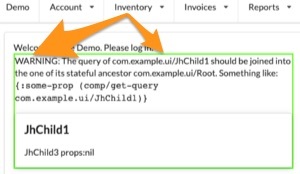A development-time library for Fulcro that helps to detect problems earlier and find and fix their root cause faster.
For additional help, see the Fulcro Troubleshooting Decision Tree.
Fulcro does an awesome job of checking your code and providing helpful messages but it is inherently limited by the fact that most of its checks are compile-time. fulcro-troubleshooting checks your application at run time and thus has much more insight into what is really going on. It also integrates with the UI so that you see the errors and warnings right in the UI, next to the place where you observe the problem.
Warn you when a component's query is not included in its parent's:
Experimental configuration (subject to change):
(set! holyjak.fulcro-troubleshooting/*config*
;; return truthy to check the inclusing of the component's query in an ancestor
{:query-inclusion-filter (fn [component-instance comp-class]
(not= comp-class :com.example.ui/MyComponent))})
;; OR: (when goog.DEBUG (set! js/holyjak.fulcro_troubleshooting._STAR_config_STAR_ {..}))Warn when there is something fishy about the component's ident:
Warn when there is no data for a child, perhaps because the data has failed to load, or is at the wrong place of the DB, or because you have not provided :initial-state for the component (which is optional but crucial e.g. for Link Query - only components):
Experimental configuration (subject to change):
(set! holyjak.fulcro-troubleshooting/*config*
;; return truthy for any join prop that should be check for having non-nil data in the props:
{:join-prop-filter (fn [component-instance prop] (not= prop :jh/address))})
;; OR: (when goog.DEBUG (set! js/holyjak.fulcro_troubleshooting._STAR_config_STAR_ {..}))You can also get rid of this warning by using :initial-state and setting it to something non-nil such as [] for a list or {} for a map. (Though remember that in the Template Form {} means "include initial state from the child" so, if there is a child element for that prop, set also its initial state. And remember to propagate the initial state up all the way to the root component.)
Ideally, you would use the template form of :initial-state as it checks that you only include props that you query for.
This check controls that you actually return either nil or a map and that the map has no key you do not query for (contrary to the template form check, this works also for the lambda form, though it is less powerful).
User components wrapped with React Error Boundary
Non-Fulcro components are wrapped with an Error Boundary so that if their render throws an exception, it is caught and displayed in the UI, instead of taking the whole page down.
Alpha quality but already pretty useful library, under active development. Do not hesitate to try it out and share your feedback!
Get in touch with @holyjak in the #fulcro channel of the Clojurians Slack if you have any questions, problems, ideas, or comments.
Add the library to your project:
;; deps.edn
:aliases
{:dev {:extra-deps {holyjak/fulcro-troubleshooting
{:git/url "https://github.com/holyjak/fulcro-troubleshooting"
;; run `clojure -X:deps git-resolve-tags` to insert the correct :sha
:sha "177afe5a3c043777f944cb28b73332d6136796ae"
:tag "latest"}}}and make sure that the :dev alias is activated and the library's names is automatically required:
;; shadow-cljs.edn
{:deps {:aliases [:dev]}
:builds {:main {:devtools {:preloads [holyjak.fulcro-troubleshooting ...] ...}
...}}}(Assuming you have activated the dev alias in your shadow-cljs.edn.)
When you create your Fulcro/RAD app, add the middleware provided by the library:
(ns my.app
(:require
;; [holyjak.fulcro-troubleshooting] ; add if you haven't added it as :preload
[com.fulcrologic.fulcro.application :as app]))
(defonce app (app/fulcro-app {:render-middleware
(when goog.DEBUG js/holyjak.fulcro_troubleshooting.troubleshooting_render_middleware)}))
;; we use js/.. instead of holyjak.fulcro-troubleshooting/troubleshooting-render-middleware so that
;; the code will still compile for prod release, when the lib is not included- check initial state (if present) to be a map with keys <= query keys
Copyleft 2021 Holyjak
Distributed under the Unlicense, see http://unlicense.org/.



